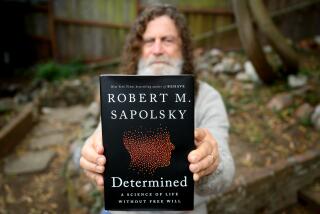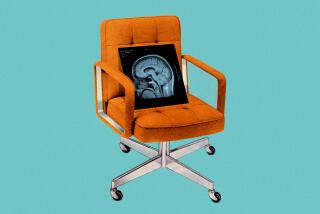What Makes Johnny Good? Rewards or the Ghost in the Machine? : Behavior: Mental events are difficult to study. But we need to break this barrier--not ignore it--if we are ultimately to understand human behavior.
- Share via
SAN DIEGO — Poor Fred Skinner. He lived his life rejecting the mind. He only believed in things he could observe. He wanted to understand human and animal behavior, but the conventionalwisdom of many people, including psychologists, was that human behavior was controlled by thought and reason, by mental processes--by mind.
The mind? What could that be? Can it be seen? Can it be measured?
To B.F. Skinner, the mind was like those imaginary demons that frighten children in the dark, demons that must be scourged from psychology for it to proceed as a science.
Science proceeds in strange ways. It isn’t really the orderly, logical process that it is advertised to be. In the long run, science overcomes its mistakes and advances toward comprehensive understanding. But along the way, it gets distracted by personalities, by whims and by feuds that break out among humans who are also scientists.
Skinner was a great scientist, but he disrupted the systematic development of psychology. He had a major blind spot: He denied that mental activity plays any major role in human behavior.
He was a charismatic fellow; his powerful experimental procedures attracted a hearty band of followers. He presented a simple story of behavior, in which all animals followed the same laws, be they rat or pigeon, dog or person. Oh, it was captivating and influential. Grab young college students, teach them to condition animals to do marvelous tricks, and they are converted for life. Who needs the mind?
Skinner grew up in a mechanical age when the aspiring scientist could learn how things worked just by observing them: gears meshed with other gears, cams and levers pushed upon other objects. All this talk about mental activity was about invisible stuff--theories, for goodness sake.
Skinner thought that the difficulty of studying mental phenomena proved their non-existence. He fought hard to resist the study of cognition: If he would have had his way, cognitive phenomena would have been banished from science. His persuasive influence caused several generations of American psychologists to ignore the study of the mind. Fortunately, he didn’t convince us all, and his dominance was mostly a U.S. phenomenon.
Skinner’s failing was that he matured before the Information Age and never grasped such concepts as information, knowledge and computation. Today, we have a much more sophisticated understanding of computation than ever before.
We are starting to understand the differences between the kinds of computations done by biological processes and those done by today’s computers. We are gaining a much deeper understanding of what knowledge might be, of how decisions are made and of what thought is--the creative use of prior experience in novel situations.
The brain is not a computer, at least not anything like the computers that currently exist. But the brain does indeed provide the physical mechanisms for the behavior of the mind, including information processing, thinking, remembering, creating and imagining.
The human brain is one of the most complex structures in existence. Mental operations are performed in the human brain by its trillion neurons, each connected to as many as 10,000 other neurons, each sending from one to 100 signals per second--a total of some 1016to 1018events per second (1018means the digit 1 followed by 18 zeros. That’s even larger than the national debt!). Is it any wonder that its scientific study proceeds so slowly?
Mental events are, indeed, difficult to study. Only a limited amount of mental behavior reaches conscious awareness. We are influenced by the environment, by past experience, by emotions and by the powers and limitations of mechanisms of human thought. Nevertheless, we need to break this barrier if we are ultimately to understand human behavior.
The study of human cognition thrives. It is a dominant force in the scientific study of psychology, and it is the basis for the new discipline of cognitive science--the study of mental phenomena, combining the study of brain sciences, language, society, culture, psychological behavior and of intelligent machines into one field. Research groups and educational programs in cognitive science flourish across the country and around the world.
The study of human thought and cognition cannot afford to be dogmatic, to have a closed mind. Science has to accept a wide variety of approaches and to advance through rigorous evidence and explanations, not through personal schools and beliefs.
Cognitive science follows this approach, accepting the advances from all fields in an honest attempt to understand the human mind. No single person dominates. Instead, many contribute to the general scientific development. Indeed, some of B.F. Skinner’s methods are part of the scientific basis for our understanding of cognition.
Today, we are moving forward in our understanding by pursuing multiple approaches, each contributing to our understanding of the most challenging scientific study of all--the study of the mind.






